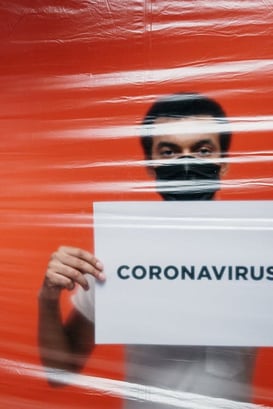Share this
COVID-19 Screening Before Re-Entry to Work, School, Military
by Christa Nuber on July 8,2020
Blood collection for COVID-19 testing aims to protect employees, students and soldiers.
As businesses, universities and the Arm ed Forces begin reopening during the coronavirus pandemic—before a working vaccine against COVID-19 is available—many employers and organizations are asking staff, students and soldiers to undergo re-entry testing for both active COVID-19 infection and SARS-CoV-2 antibodies.
ed Forces begin reopening during the coronavirus pandemic—before a working vaccine against COVID-19 is available—many employers and organizations are asking staff, students and soldiers to undergo re-entry testing for both active COVID-19 infection and SARS-CoV-2 antibodies.
This type of “re-entry screening” is a safety measure aimed at preventing new cases of COVID-19 illness in the workplace and other shared spaces. Because many of the early tests proved to be unreliable, organizations are now seeking more reliable, proven methods for specimen collection and testing.
One approach has been to collect blood samples from people for serology testing that reliably detects SARS-CoV-2 antibodies. The presence of antibodies in the blood indicates a past exposure or infection, and may confer some degree of natural immunity to COVID-19—though this has not yet been proven for the novel coronavirus. Nonetheless, remote blood microsampling with the Mitra® microsampler and Mitra® Blood Collection Kits from Neoteryx may be the best approach to reliable antibody testing moving forward.
When organizations utilize nasal and oral swab testing to screen for active COVID-19 infections, it is essential to keep in mind that people may not test positive for the first 3-5 days after infection. Even if they test positive for coronavirus, many of the nasal/oral COVID-19 tests have a high rate of false negatives. In other words, non-specific testing means that some COVID-19 cases can be missed, and things can get bad very quickly.
To truly guard everyone in the workplace from potential exposure, a one-time re-entry test with nasal or oral swabs isn’t nearly sufficient for a viral disease that has a roughly 3-5 day incubation period. It is also important to keep in mind that antibodies won’t show up in the blood until roughly 14 days after an infection, so the timing for collecting nasal/oral specimens versus blood specimens will be different.
Employers considering COVID-19 screenings as part of a safe reopening plan should look to the US Armed Forces as an example of the inherent challenges of coronavirus testing. The US Army medically screened and virus-tested a recent group of 640 army recruits and their instructors upon arrival at Fort Benning, Georgia. From that group, all but four tested negative for active COVID-19 upon arrival.
The four COVID-positive recruits were isolated from the others and medically treated for COVID-19 illness. The “healthy” recruits and instructors in the group were monitored for 14 days to guard against emerging cases of COVID-19. After 14 days, no one else in the group presented with symptoms of a viral illness, so training commenced with face masks and social distancing protocols in place.
However, eight days after training began, another recruit reported viral symptoms. In response, a second round of nasal/oral testing was performed on the entire group, and it was found that 142 from the entire group of 640 people now tested positive for COVID-19.
As reported by Connecting Vets, the majority of these 142 COVID-positives were reported to be asymptomatic, but they were isolated or quarantined. All facilities and common areas were sanitized, and Fort Benning initiated contact tracing in an effort to understand how this happened despite their best efforts to guard against cross-contamination.
The Marine Corps recently experienced similar COVID-19 clusters among recruits who had initially tested negative for the novel coronavirus. Why did early COVID-19 prevention efforts at basic trainings among our Armed Forces fail despite their diligence, and what can we learn from this?
Perhaps the obvious answer is that re-entry screening is a good idea, but not infallible, so taking extra safety measures is advisable. Reports indicate that the US Army and other branches of the Armed Forces have already begun exploring or implementing additional safety measures and more reliable tests.
Antibodies May Help Us, But How Much?
SARS-CoV-2 antibodies are a hot topic in the news and on social media, but why? Antibodies are the body's natural defense mechanism for fighting off disease and reinfection—the body begins developing antibodies when it encounters a viral invader. This process is the concept behind vaccinations.
A vaccine, such as the annual flu shot, is composed of inactive or non-infectious parts of a virus with the intention of triggering the body to develop antibodies that will help defend it against the real disease when it is encountered in the world. This concept has worked successfully for developing vaccines against viral infections like the chicken pox, and to some degree, influenza. However, developing an effective vaccine takes time.
COVID-19 is such a new disease that, while scientists hope and expect SARS-CoV-2 antibodies to provide some protection, it is uncertain what level of protection they truly provide. Scientists the world over are spending countless hours researching this very concept.
Through serology testing of numerous blood samples, they are finding that many COVID-19 survivors develop antibodies, but perhaps not enough to fully guard against reinfection. For this reason, even if a person’s blood test is positive for SARS-CoV-2 antibodies, they should continue to follow all of the safety guidelines, including social distancing, washing hands, and wearing a facemask as outlined by the CDC, local governments, and health departments.
If SARS-CoV-2 antibodies are eventually proven to confer some immunity against future COVID-19 infections, having been tested for them will provide valuable information for individuals and their employers when considering plans and processes for reopening and maintaining a safe work environment.
For more information on remote microsampling for COVID-19 and infectious disease studies, click below:

Share this
- Microsampling (41)
- Industry News, Microsampling News (37)
- Mitra® Device (34)
- Company Press Release, Product Press Release (22)
- Research, Remote Research (18)
- Infectious Disease, Vaccines, COVID-19 (15)
- Clinical Trials, Clinical Research (14)
- Biomonitoring, Health, Wellness (10)
- Blood Microsampling, Serology (10)
- Decentralized Clinical Trial (DCT) (8)
- Omics, Multi-Omics (7)
- Venipuncture Alternative (6)
- Skin Microsampling, Microbiopsy (5)
- Harpera Device (3)
- Specimen Collection (3)
- Toxicology, Doping, Drug/Alcohol Monitoring, PEth (3)
- Pharmaceuticals, Drug Development (2)
- Therapeutic Drug Monitoring, TDM (2)
- Antibodies, MAbs (1)
- Environmental Toxins, Exposures (1)
- Preclinical Research, Animal Studies (1)
- hemaPEN® Device (1)
- February 2026 (1)
- January 2026 (1)
- December 2025 (1)
- May 2025 (1)
- April 2025 (1)
- February 2025 (4)
- September 2024 (1)
- August 2024 (1)
- May 2024 (2)
- January 2024 (1)
- December 2023 (2)
- November 2023 (3)
- October 2023 (2)
- September 2023 (1)
- August 2023 (3)
- July 2023 (3)
- June 2023 (1)
- May 2023 (2)
- April 2023 (1)
- March 2023 (2)
- February 2023 (1)
- January 2023 (2)
- December 2022 (1)
- November 2022 (1)
- October 2022 (2)
- August 2022 (1)
- April 2022 (1)
- February 2022 (1)
- January 2022 (1)
- December 2021 (1)
- November 2021 (1)
- October 2021 (2)
- September 2021 (1)
- August 2021 (2)
- July 2021 (2)
- June 2021 (2)
- April 2021 (1)
- March 2021 (2)
- February 2021 (1)
- January 2021 (1)
- December 2020 (1)
- November 2020 (1)
- October 2020 (1)
- September 2020 (2)
- August 2020 (3)
- July 2020 (3)
- June 2020 (2)
- May 2020 (1)
- April 2020 (3)
- October 2019 (1)
- March 2019 (1)
- January 2019 (1)
- November 2018 (1)
- August 2018 (1)
- July 2018 (1)
- June 2017 (1)
- April 2017 (1)
- March 2017 (1)
- February 2017 (1)
- May 2016 (1)
- December 2015 (1)
- October 2015 (1)
- August 2015 (1)
- August 2014 (1)
- July 2014 (1)


No Comments Yet
Let us know what you think